
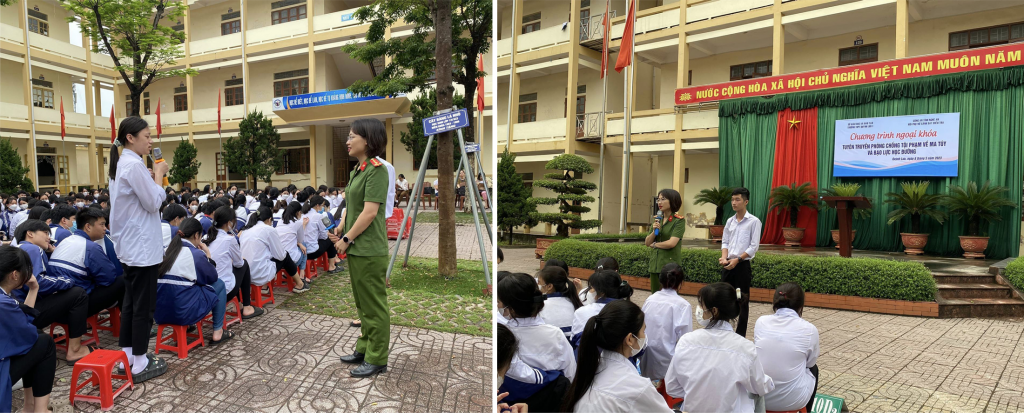

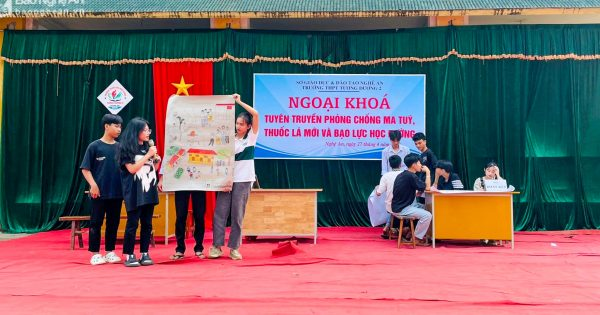
Sharing at a forum on school violence held a few days ago in Nghe An, Mr. Dang Hoa Nam - Director of the Department of Children, Ministry of Labor - Invalids and Social Affairs said that students and young people are not only subjected to hot violence (violence through actions) but also "cold violence", "white violence" with forms of mental impact such as boycott, psychological pressure... This is the most haunting form for many students. They are not only subjected to violence in real environments but also in cyberspace.
The recent heartbreaking incident at Vinh University High School for the Gifted is a similar example. Up to now, although the police have not yet concluded whether the 10th grade female student's suicide was due to school violence or not, it can be confirmed that boycotting occurred in this class. Right from the beginning of the school year, in the chat group of parents, they also warned that there was a group of female students who often boycotted their classmates. This class also often skipped classes, and any student who did not skip would be boycotted? In addition, before committing suicide, the 10th grade female student often shared with her mother that she was afraid to go to school because of being boycotted by her classmates. The sad thing is that the school and parents did not recognize the seriousness of the incident, leading to heartbreaking consequences.

Dien Chau 3 High School has also just dealt with a similar situation. The student is a female 11th grader named T. who often argues and clashes with her classmates. Through the homeroom teacher's monitoring and investigation, any student who sits close to or talks to her will be scolded by this student when she is not pleased and gradually no one in the class dares to play with T. She is at risk of being isolated by her friends because of her personality and has asked to change classes. Meanwhile, the class she is studying in is a selective class of the school and it is quite unusual for a student in a high-scoring class to ask to change to a normal class. In response to this incident, the homeroom teacher reported to the school's board of directors to come up with a solution.
In fact, T. had fallen into a state of mild depression. However, although the school proactively invited T.'s parents to meet, share and find a suitable solution, in two meetings, the parents denied any unusual manifestations in their child's personality and behavior. On the third time, T.'s parents said that their child had indeed shown signs of depression. When the parents dared to speak frankly about their child's condition, the school principal was able to have a frank discussion. "I told the parents that the teachers and the school had long recognized the student's abnormalities, but were not allowed to draw conclusions because the teachers themselves were not doctors. But after receiving the cooperation of the parents, I proposed a solution that allowed the student to be transferred to any class he or she liked in grade 11 and thereby avoided any unfortunate incidents," recalled teacher Phan Trong Dong - Principal of Dien Chau 3 High School.
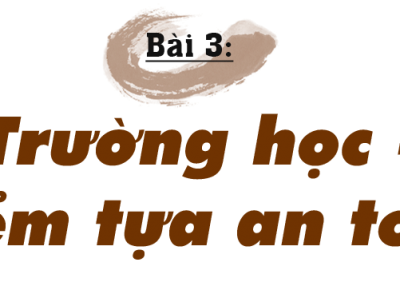
Why does depression occur in school-age children? In addition to academic pressure and pressure on achievement, students also have many other pressures from school relationships. A female high school student in Vinh city said that the problem of boycotting is the biggest obsession for students today. “Almost every school has this situation. Even if they are not beaten, the mental damage is huge. There are countless reasons for a student to be boycotted by their friends,” the female student said.
Sharing the reason why she once hated a certain friend, did not want to play with him and tried to persuade the other friends in the group, class not to play with him, student Nguyen Pham Gia Nhi - class 11A1, Huynh Thuc Khang High School (Vinh City) said: Personally, I think that, during the years of going to school, we must have had times when we did not like, even hated, a certain friend. I myself, since the first years of secondary school, did not like, intentionally created a group of female friends to isolate, said mean things about a female friend in the class. Of course, at that time, I was still young and did not realize that this behavior was school violence, but only thought that it was a conflict between friends. I also thought that I did not like my friend and also wanted other friends not to play with that friend. After growing up and having certain knowledge, I realized that school violence is all behaviors, both in words and actions. I can't imagine what kind of psychological problems he would have had if he had continued to isolate himself and not play with his friends. He might have become a victim of school violence.

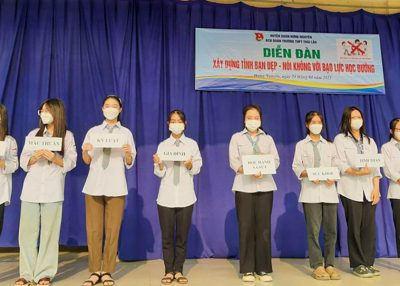
According to the reporter's research, many students are boycotted for very "trivial" reasons. Sometimes it's just because they don't go out with their friends or because they are more beautiful and more noticed by boys; there are cases where they are boycotted because they study well and don't let their friends see their work; there are cases where they are also boycotted because they study poorly. Sadly, some students are boycotted just because their families are poor, others because of their bad appearance...
The forms of boycott are also very diverse, but most of them are isolating the victim, not talking to them, not playing with them, gossiping, teasing them... Especially since the development of social networks, this situation has caused more damage to the victim. That is, the victim has had chat groups created to gossip, had their photos edited, and been attacked on Facebook... "Thinking back now, I still feel scared. That feeling was terrible. Every morning when I woke up and had to go to school, I was scared. No one talked to me, no one played with me. Every night when I came home from school, I cried," said a female student who was boycotted.
After many years of working as a homeroom teacher, teacher Tran Thi Ha - Quynh Luu 3 High School said: One of the reasons for the increase in school violence is the impact of social networks. In fact, as a homeroom teacher, I have noticed that students' use of social networks is very indiscriminate, some students have had conflicts and quarrels because of uncivilized behavior on Facebook, Zalo... The fact that students do not orient themselves about the amount of information they read, watch, or provide online leads to distorted, erroneous thinking and being far from reality, neglecting their studies, wasting time on useless things is very common. It is the immersion in the virtual world that gradually loses inherent confidence, moral and spiritual degradation when regularly watching bad news and images related to violence. Meanwhile, the propaganda work on the issue of using and behaving culturally on social networks in schools is only a reminder and warning in nature, without providing specific and practical measures, and has not met the understanding needs of students as well as the requirements of society.

“How to use social networks to benefit yourself and spread good things in society is still a challenging issue in the current social context and even in the school environment. We think students need to be equipped with the necessary knowledge and skills to know how to provide, use and behave culturally on social networks when facing the storm of social networks,” teacher Tran Thi Ha added.
Meanwhile, teacher Ngo Thuy Nga - Teacher of Nghi Loc 3 High School said: There are many causes of school violence, such as family, from the students themselves, from school. Besides, there is another cause from society. Violent culture as in movies, books and games with violent tendencies... is increasingly widespread on the internet and is not strictly censored. From there, it leads to subjects in adolescence being curious and exposed to those types. From there, the psychology of school violence is born in real life. Therefore, in addition to protecting children from becoming victims of school violence, parents need to be close, psychological, and observe children's unusual manifestations to detect them promptly. Parents and teachers need to review the causes of school violence and take appropriate actions to prevent children from continuing the behavior.
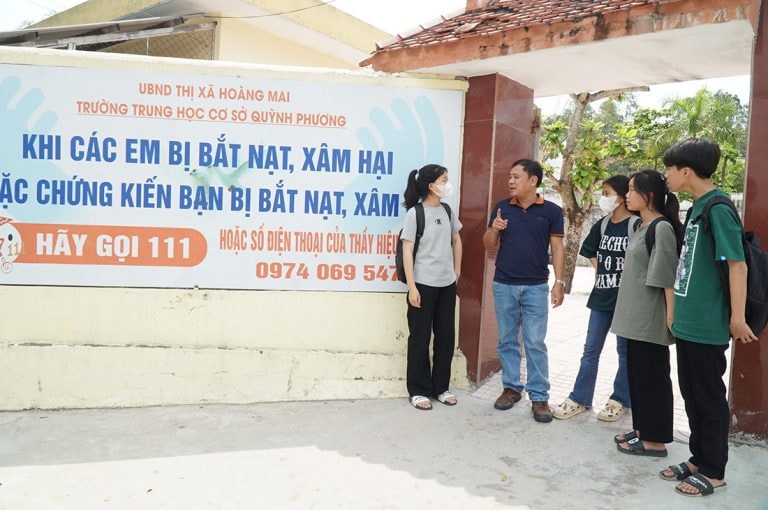
At the recent forum on school violence held in Vinh city, Mr. Dang Hoa Nam - Director of the Department of Children, Ministry of Labor - Invalids and Social Affairs also added: There is a common concern, the more silent we are, the more isolated violence continues and the more serious the trend. The children are lonely, do not know who to share with, are not cared for, and finally they find the most negative solution, which is to choose suicide. That is a regrettable case, a sad story.
Mr. Dang Hoa Nam also hopes that if students witness violence or hear their friends share, they should speak up, share with agencies, organizations, families, schools or with the people they trust most: Around them, they are not alone, there are many people willing to listen and share. So "Please share, speak up, don't be silent"...


